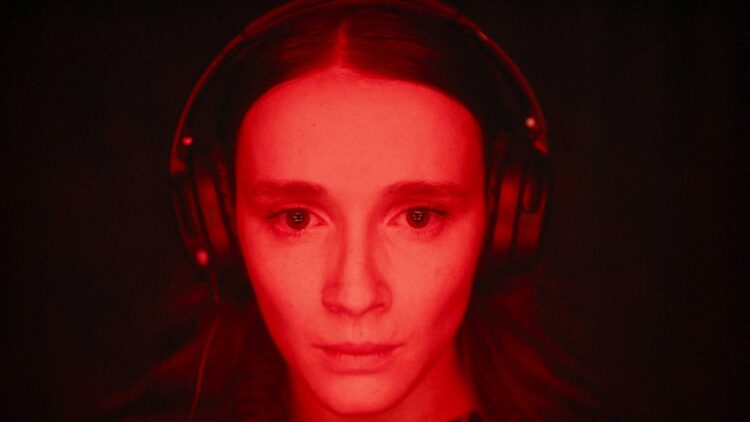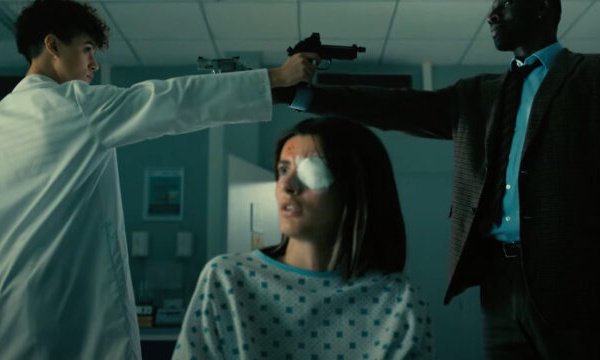

Killers of the Flower Moon‘s epilogue felt like the last word on true crime: a director with several based-on-a-true-story tales to his name emerging from behind the camera to highlight the shortcomings of a genre that reduces victims to collateral damage in stories more compelled by their killers. That it arrived as splashy courtroom dramas made a big comeback––and even partially falling into that category itself––was an accident, but taken alongside the likes of Anatomy of a Fall or Saint Omer, it was clear that a need to tackle the subjectivity of this genre, and our obsession as uninvolved observers, was in the air.
Arriving more than a year after its Karlovy Vary premiere, Canadian thriller Red Rooms feels most like a dark companion piece to Saint Omer in its perspective-shifting analysis of a courtroom observer, although that’s where the similarities end. Director Pascal Plante’s tale of true-crime obsession pushed to one of its most uncomfortable, logical extremes doesn’t attempt to rip up the rulebook of how courtroom dramas operate so much as it tries grappling with the sensationalized allure of murder cases and the disastrous consequences of third-party observers feeding off the personal trauma of others. That it manages to be so critical whilst succeeding as a nihilistic thriller at face value––albeit one closer in tone to Olivier Assayas’ Demonlover than David Fincher, to whom it has been regularly compared––is its greatest achievement, a stealth satire of which Paul Verhoeven would be proud.
Juliette Gariépy stars as Kelly-Anne, a freelance model and successful online poker player who, like seemingly all of Montreal, is fascinated by the gruesome schoolgirl murders for which dark-web live streamer Ludovic Chevalier (Maxwell McCabe-Lokos) is being tried. Plante is initially keen to position his protagonist as a passive observer; even if she slept on the streets outside the court to arrive on time for the first day of the trial, his camera is eager to lose her amidst seated crowds as the prosecution and defense make their opening statements. In a post-Emmanuel Lubezki world, it’s become easy to look at a drawn-out long take with skepticism––no matter how good they may look, being convinced there’s artistic purpose beyond showboating is a tough ask. Plante’s extended oner is the rare attempt that succeeds because it doesn’t call attention to itself. Even as it takes in everyone from the accused to the jury and families of the victims, it’s serving to deglamorize and demythologize a court case you can see reporters frantically writing notes on in real time. It’s engaging even as it’s colder and far more administrative than everything that follows, asking the jury––and viewing audience––to keep the victims at the forefront of their mind in a way Kelly-Anne doesn’t intend.
Outside the court, she begrudgingly bonds with Clémentine (Laurie Babin), a young trial attendee who’s convinced of Ludovic’s innocence. She’d never met the accused killer, but through a steadfast belief that people are innocent until proven guilty, still writes off the piles of well-documented evidence as part of a conspiracy to condemn an innocent man. The killer remains onscreen throughout the trial but silent and seemingly disengaged despite his not-guilty plea, not even paying any mind to the true-crime obsessives in the stands who have developed parasocial relationships with him. Plante’s masterstroke is ensuring he remains a consistent presence without giving him any identifiable characteristics; he’s whatever the two protagonists project onto him at any given moment, with no further editorializing needed from the writer-director. Extracting the killer from an exploration of true-crime brain rot is an effective way to tackle the inherently problematic nature of people narrativizing tragedies they played no part in. His presence is felt, but he remains nothing more than an idea, only furthering the detachment between two different but equally in-too-deep characters and a wider world that finds them and their obsessions uncomfortable to be around.
Both actresses deliver stellar performances, but Gariépy’s got under my skin more than any I’ve seen recently: an emotionally unknowable presence whose fascination with the macabre and knowledge of the criminal depths of cyberspace are invoked in ways that never make it clear where her sympathies lie. Her understated performance certainly helps Plante sell the driest satirical punchlines as she flits in-between niche, illegal corners of the dark web and the mainstream world of fashion. It’s not a particularly sophisticated gag, but seeing her hack into personal accounts belonging to families of the victims immediately before undertaking a high-energy workout soundtracked by Rina Sawayama’s empowerment anthem “This Hell” is the definitive encapsulation of how grisly stories are consumed as mindless entertainment by the masses.
Regardless of whether you’re approaching it as a satirical examination of true-crime fandoms or as a dark subversion of the typical serial-killer thriller, Red Rooms is an unsettling, uncompromising accomplishment. As with Killers of the Flower Moon’s epilogue, being exposed to it will make you reconsider any affinity you may have had for the genre beforehand.
Red Rooms opens on Friday, September 6.
The post Red Rooms Review: Nihilistic Thriller and Stealth Satire is an Unsettling Examination of True-Crime Obsession first appeared on The Film Stage.



